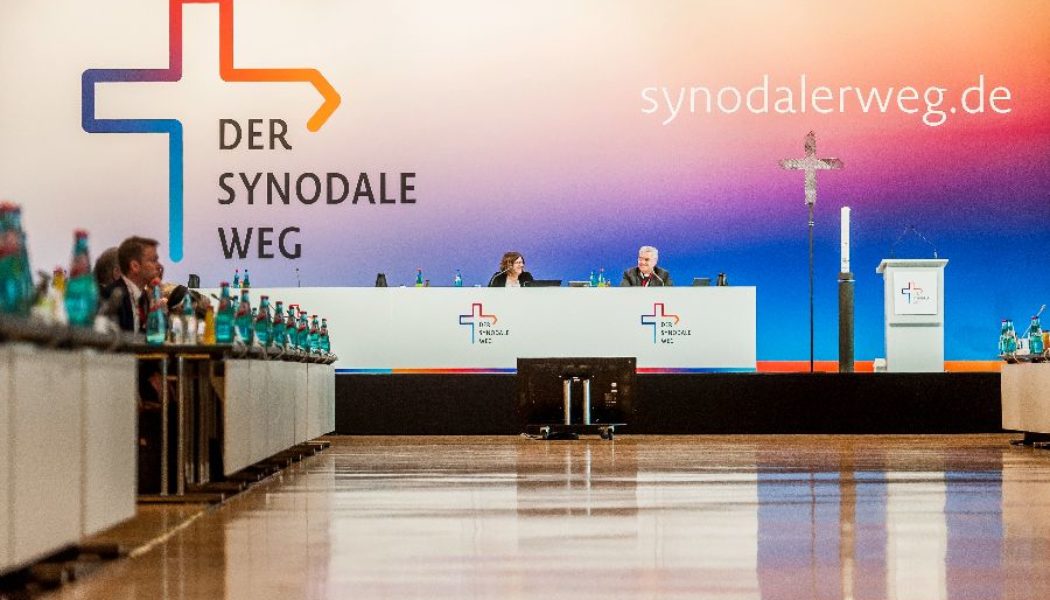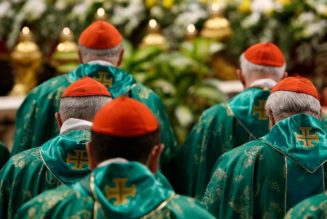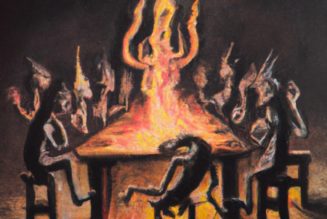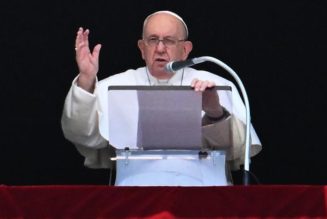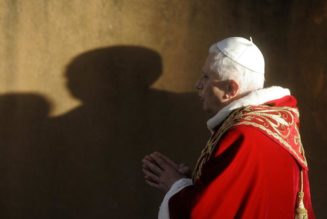
Members of the German “synodal way” failed to pass on Thursday a resolution calling for a change in the Church’s approach to sexual ethics. The resolution failed to gain enough support from bishops at a synodal meeting held this week in Frankfurt.
More than two-thirds of participants in the synodal way process voted to adopt a 30-page document entitled “Life in succeeding relationships – The principles of renewed sexual ethics.”
But the resolution did not gain two-thirds of the synodal way’s bishop participants, a requirement for the passage of any resolution. Sixty-one percent of voting German bishops were in favor of the resolution, according to initial German media reports; 33 bishops voted for the motion, 3 abstained, and 21 bishops voted no, enough to stop the resolution’s passage.
The text argued that “it will not be possible to reorient pastoral care without re-defining the emphasis of the Church’s sexual teaching to a significant degree.”
It said it is “urgently necessary to overcome some of the restrictions in questions of sexuality, for reasons of sexual science as well as theology.”
The draft text also asserted that “same-sex sexuality – also expressed in sexual acts – is … not a sin that causes separation from God, and it is not to be judged as intrinsically bad.”
After the vote, delegates spoke from the floor for more than two hours about the decision, with many participants expressing their frustration with the bishops’ votes. Most participants said bishops had not listened to their people, and that their decision would both harm German Catholics and foment division in the Church.
Some participants said that bishops opposing the document should have expressed their views during open debate, and other urged that future votes at the assembly should take place on the record, with the votes of each bishop recorded by name.
According to the synodal way’s official social media accounts, Bishop Georg Bätzing, president of the German bishops’ conference, said he was “personally disappointed with this vote.”
“I couldn’t see in the debate what the majorities would be like. That means for me: the practice of synodality has not yet gone far enough,” Bätzing said Thursday.
Cardinal Reinhard Marx, former president of the bishops’ conference, also said that he is: “very disappointed. The bishops must also publicly stand by their positions and should justify them.”
Irme Stetter-Karp, co-president of the synodal way and leader of the lay-run Central Committee of German Catholics said after the vote that she believed bishops had not expressed their real views during the debate.
“There is one point in which I am particularly disappointed: that there are bishops in this assembly who are not prepared to voice their opinions,” she explained.
The lay leader voiced her frustration:
“Why do we invest so much energy and time? For our Church. And that’s why I’m staying here. Even if I ask myself the question: Who knows whether this is the right investment of time.”
Young participants at the synodal way say “so much for the separation of powers” as they leave the hall, after bishops rejected a vote to rethink Catholic sexual morality. https://t.co/rmJ0XGLzla
— JD Flynn (@jdflynn) September 8, 2022
The 209 synodal way members at the meeting had been scheduled on Thursday to vote on two other texts, during the first day of a three-day meeting that will be closely watched at the Vatican, which issued a warning about the initiative in July.
But with discussion of the sexual morality document stretching more than two hours after the vote, the day concluded before other votes could be held. Some lay members announced plans for a closed-door evening session which would not include bishops, while the bishops themselves planned their own session to discuss the days’s events.
The Thursday meeting closed with a prayer taken from Psalm 22, a psalm of lament – a fact noted by conference organizers before prayers began. After the psalm, participants joined in a hymn – “Nada te turbe” – that some organizers said should be a “song of defiance at the end of this day.”
Participants had been expected to vote on adopting a 31-page text entitled “Women in ministries and offices in the Church.”
The document says that “for generations, many women have known that they were called by God to be deaconesses or priestesses” and “in future, it should no longer be gender that decides on the allocation of ministries, but the vocation, abilities, and skills that serve the proclamation of the Gospel in our time.”
The assembly was also expected to vote on a 20-page text, “Priestly existence today.”
That document calls for “priestly ministry to be truly inculturated into contemporary society” in the wake of the clerical abuse crisis, which has had a devastating impact on the German Church.
On Sept. 9, participants are scheduled to vote on a text called “A re-evaluation of homosexuality in the Magisterium,” which proposes alterations to the Catechism of the Catholic Church.
They are also scheduled to consider a controversial proposal to create a powerful permanent “synodal council,” composed of bishops and laypeople, to oversee the Church in Germany.
A total of 14 texts will be discussed during the week’s meeting, with five facing their first vote and nine having their second reading. After documents pass their second reading, they are formally adopted as resolutions of the synodal way.
The assembly in Frankfurt will be followed by smaller meetings of members of the initiative’s four “synodal forums,” dedicated to power, the priesthood, women in the Church, and sexuality.
All participants will gather again in Frankfurt on March 9-11, 2023, for final votes on the synodal way’s remaining documents.
This story is developing and will be updated.
Sign in or become a The Pillar member to join the conversation.
Just enter your email below to get a log in link.
Join Our Telegram Group : Salvation & Prosperity
